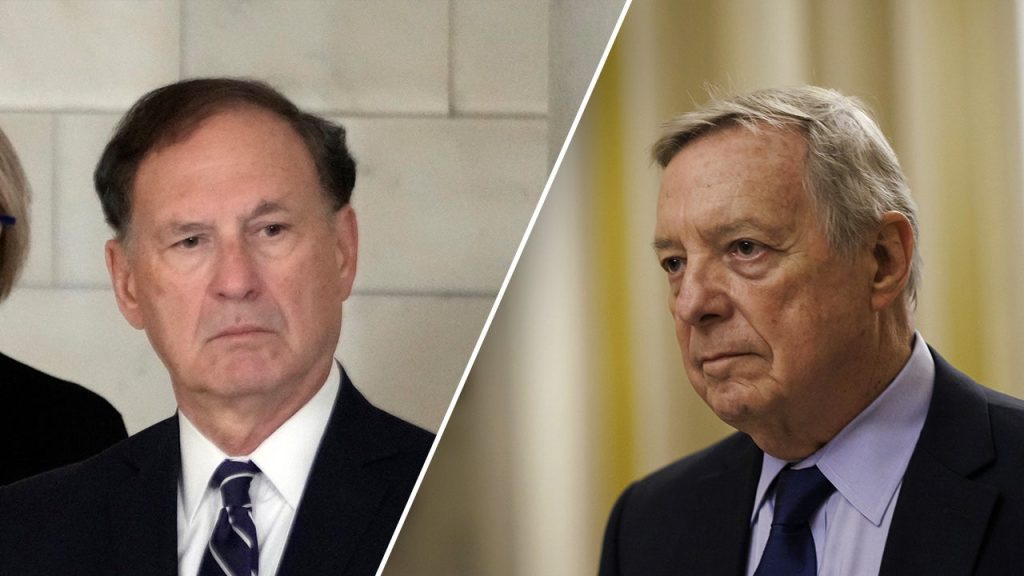Supreme Court Chief Justice John Roberts is under pressure to ensure that Justice Samuel Alito recuses himself from any 2020 election-related cases following reports about flags flown at Alito’s two homes shortly after the Capitol riot on January 6, 2021. Senate Judiciary Committee Chairman Dick Durbin and Chairman of the Judiciary Subcommittee on Federal Courts Sheldon Whitehouse wrote to Roberts expressing concerns about Alito’s actions, stating that he failed to avoid the appearance of impropriety and may have created doubts about his impartiality. They have called for Alito’s recusal in these matters and have requested a meeting with Roberts. The Democratic senators are also advocating for a code of conduct for Supreme Court justices to ensure transparency and ethical behavior.
Alito explained that the upside-down flag at his home near Washington, D.C., was flown after a dispute with political neighbors, and the “Appeal to Heaven” flag at his vacation home has historical significance and is not related to the Capitol riot. Many Republicans have come to Alito’s defense, interpreting the flags as symbols of patriotism and historical references. The phrase “appeal to heaven” is linked to colonists fighting against tyranny and is associated with George Washington’s leadership. Some Republican lawmakers, including Sen. Tom Cotton and Sen. Mike Lee, have expressed support for Alito and his wife, who chose to display the historic flag at their personal property.
Progressive Democrats, however, are using the flag controversy to renew their calls for expanding the Supreme Court to include more Democratic-appointed justices. Sen. Ed Markey and Sen. Tina Smith have called for Alito’s recusal from cases related to the January 6th insurrection and have urged for the expansion of the Court to prevent what they view as attempts by right-wing extremists to influence the judiciary. They argue that additional Democratic appointees are needed to counterbalance the current conservative majority on the Court and uphold democratic principles.
The Republican Party has defended Alito against accusations of impropriety and political bias in his actions, claiming that the flags flown at his homes have historical significance and do not indicate any wrongdoing. The controversy has sparked debates over the need for a code of conduct for Supreme Court justices to ensure ethical behavior and transparency in their decisions. The calls for Alito’s recusal from election-related cases and the discussion around expanding the Supreme Court highlight the growing polarization over judicial appointments and the influence of partisan politics on the judiciary.
The Supreme Court’s decision on the former President Trump’s immunity claim in his federal election-interference case is pending, and Alito’s involvement in such cases could be significant given the conservative majority on the Court. Durbin and Whitehouse’s letter to Roberts reflects concerns about maintaining public confidence in the impartiality of the judiciary, highlighting the importance of ethical standards for Supreme Court justices. The debate over the flags at Alito’s homes and the subsequent calls for recusal and Court expansion underscore the challenges facing the judiciary in maintaining independence and upholding the rule of law in a politically charged environment.
The controversy surrounding Alito’s flags has prompted calls for accountability and transparency in the Supreme Court, with lawmakers pushing for a code of conduct and ethical standards for justices. The differing interpretations of the flags and their historical significance reflect the broader debates over the role of the judiciary and the impact of partisan politics on legal decisions. The calls for Alito’s recusal and the discussions about Court expansion highlight the ongoing struggles to balance ideological differences and ensure the integrity of the judiciary in a polarized political landscape. Ultimately, the outcome of these debates will shape the future of the Supreme Court and its role in upholding the principles of democracy and justice.


